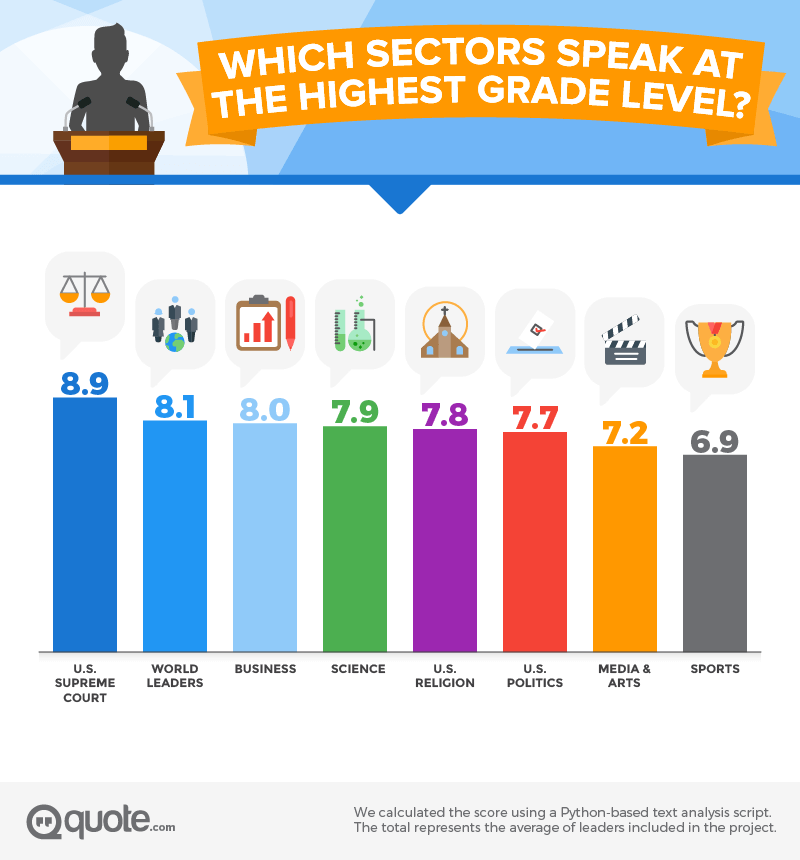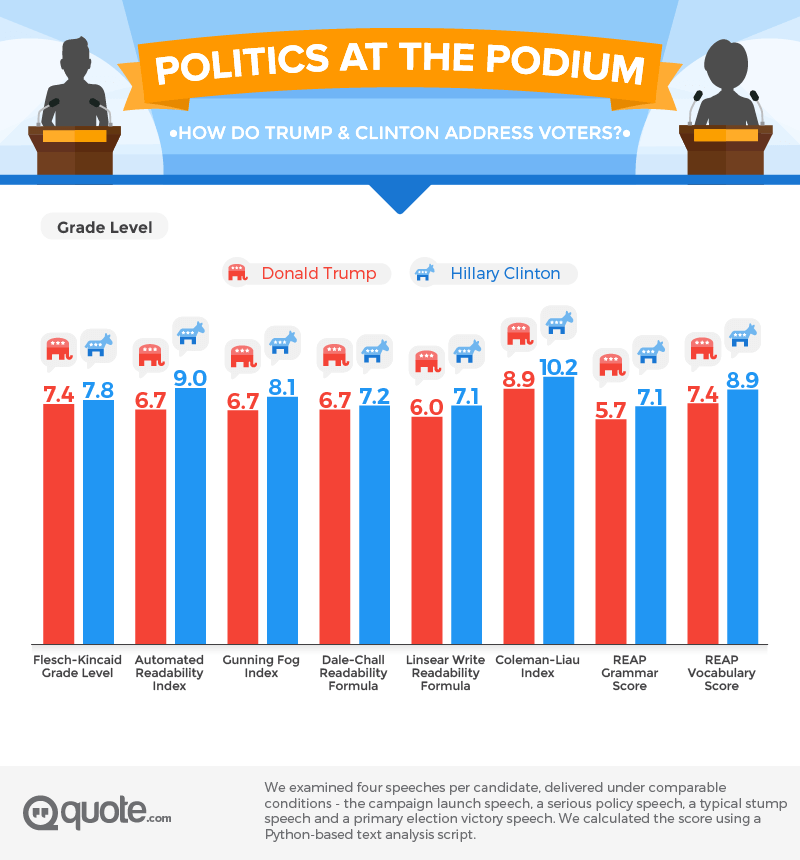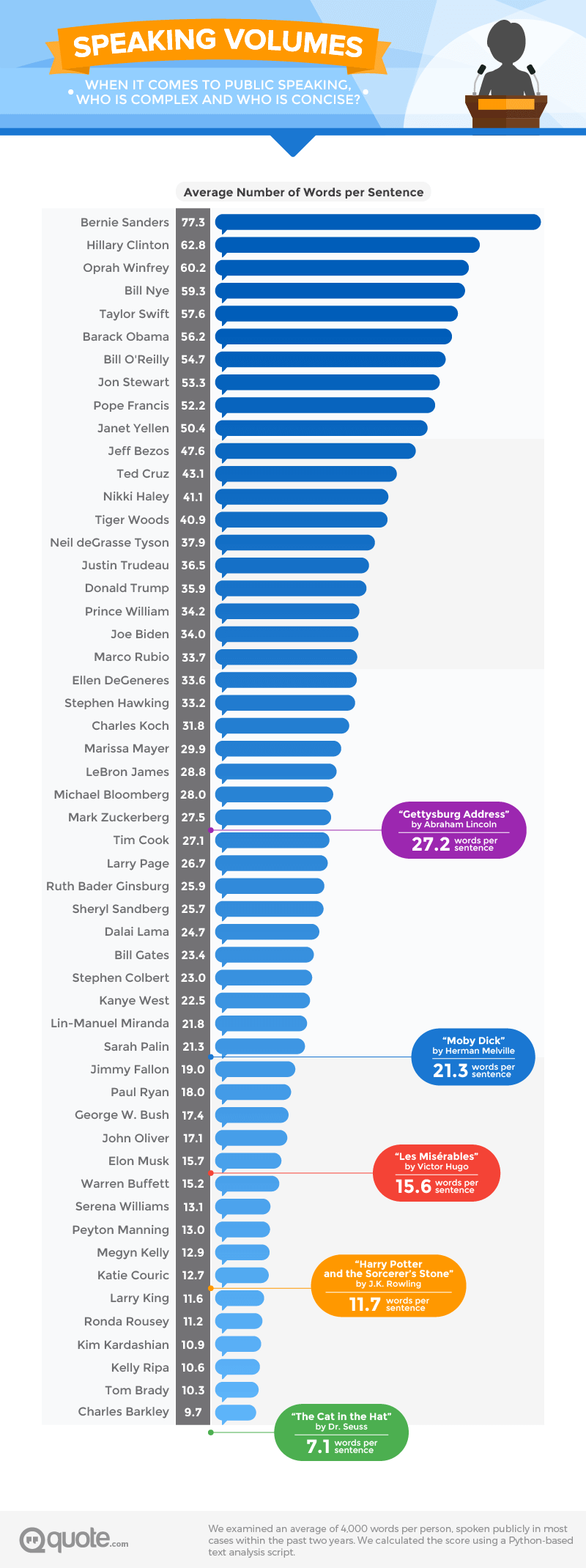
Making the Grade: Which Leaders Speak At the Highest Level?
You might be smarter than a fifth grader, but are public figures talking to you that way?
When Bernie Sanders gives a speech, his grammar and language are at a ninth-grade level. When Hillary Clinton hits the stage, it’s an eighth-grade level she’s speaking at – something she shares in common with Taylor Swift. And Stephen Colbert? He’s using language that a sixth-grader can understand.
Maybe that’s just how Stephen Colbert and Hillary Clinton talk day-to-day. Maybe it’s because they understand their respective audiences and know what language will resonate with a certain crowd. And maybe it’s because it’s been proven again and again that simple language will get you far.
After all, according to a National Institute of Literacy Study in 2014, about a quarter of Americans read below a fifth-grade level, and psychologists agree that simple language makes you sound more capable. Donald Trump connected with primary voters while hovering between a fifth and seventh-grade level in most of his speeches.
We analyzed an average of 4,000 words per person – in everything from commencement speeches to TED talks over the last two years – running eight different grade-level tests and averaging the results across a variety of celebrities and public figures. Here’s what we found.
What Grade Level Are Our Leaders Speaking At?

When renowned economist Janet Yellen makes a public speech, we had all better focus. She topped our rankings, speaking to the public at an 11th-grade level.
On the other hand, when Bill Gates, Warren Buffett, and Canadian Prime Minister Justin Trudeau take the stage, we can relax a little. They speak to us at around a seventh-grade level, with simpler words and shorter sentences.
Interestingly, George W. Bush – often criticized for his “stupid” speeches – comes in at an almost ninth-grade level. He ranks above Barack Obama and Hillary Clinton, who are both seen as more polished speakers.
Which fields Use the Simplest Language?

The U.S. Supreme Court and world leaders score high for the use of complex language and longer sentences. Media, arts, and sports, on the other hand, have the plain language thing down, speaking at an average grade level of around seven.
Perhaps this is because the Supreme Court needs more nuanced language in its speeches. Or maybe it’s because they didn’t get the memo that some of the most impactful works in the world were written or spoken incredibly simply. After all, one of Ernest Hemingway’s most famous works was written at a fourth-grade level.
Most Complex Speakers, by Field
Examining speech complexity by different fields reveals some interesting, and possibly unexpected, results. In the arts, it’s Rupert Murdoch – at a 10th-grade level – who leads the pack. In science, Stephen Hawking has the most complex speaking patterns. And in the sports arena, Adam Silver – commissioner of the NBA (and a lawyer) – speaks at the highest grade level.
On the other end of the spectrum, Dr. Bennet Omalu, Jimmy Fallon, and Jeff Bezos are the straightforward-speaking kings, all talking to us below a seventh-grade level.
Clinton vs. Trump: A Simple Language Showdown

Both Clinton and Trump speak simpler language and use shorter sentences than many other political figures, but how do they stack up against each other? For the fairest possible analysis, we analyzed four speeches for each candidate – the campaign launch speech, a serious policy speech, a typical stump speech, and a primary election victory speech.
Based on our eight tests, Clinton speaks at a higher level across the board, ranking between a seventh- and ninth-grade level. Trump, on the other hand, speaks fluent middle school, hovering between fifth and seventh grade consistently.
Words per Sentence: Complex vs. Concise

When it comes to measuring grade levels, our tests focus mostly on word length and sentence length. But if we take out the word length, who has the most complicated sentences and who’s speaking in quick and simple bursts?
Turns out Bernie Sanders leads the long-sentence pack by a large margin, followed by Hillary Clinton and Oprah Winfrey. Kim Kardashian, Kelly Ripa, Tom Brady, and Charles Barkley fall at the other end of the spectrum, keeping sentences short and sweet (or sometimes not so sweet).
CONCLUSION
It’s hard to say who’s the smartest. Is it the leaders who use the biggest words and most complex sentences, who are explaining complicated topics like economics or Supreme Court decisions with nuance? Or is it those who understand that plain language makes us sound smart and speaking to a large audience means speaking in ways we can all understand? What do you think?
Methodology
To select the leaders, we turned to respected publications like Fortune, Forbes, Time, Business Insider, and more, which publish annual rankings of influential people in various fields.
We analyzed an average of 4,000 words per person, spoken publicly within the past two years (in most cases). To provide the fairest basis for comparison, for each political candidate, we analyzed comparable remarks including their campaign launch speech, a serious policy speech, and a primary election victory speech.
For the other figures, we analyzed prepared remarks like commencement addresses, TED talks, announcements to shareholders, sermons, and so forth. To assess the grade level of each speech, we used a Python-based text analysis script and performed a variety of well-respected tests including the following:
- Flesch-Kincaid Grade Level – Measures text difficulty based on sentence length and number of syllables per word.
- Automated Readability Index – Measures the understandability of text based on sentence length and the number of characters per word.
- Gunning Fog Index – Excludes proper nouns, jargon, and familiar words; then, it measures the complexity of the remaining words based on meaning and length.
- Dale-Chall Readability Formula – Measures text against a bank of thousands of words generally understood by students of different grade levels.
- Linsear Write Formula – Measures the grade level of a text based on sentence length and the number words that have three or more syllables.
- Coleman-Liau Index – Measures the understandability of text based on sentence length and the average number of characters per word.
- REAP Grammar Score – Compares grammatical structures with a database of student texts and writing samples that are typical of particular grade levels.
- REAP Vocabulary Score – Measures word variety and vocabulary difficulty, based on a database of student texts and writing samples that are typical of particular grade levels.
The final grade level score was calculated by averaging the results.
Sources
- Fortune, 50 World’s Greatest Leaders, 2016
- Forbes, World’s Billionaires, 2016
- Forbes, World’s 20 Most Powerful Women in Business
- Adweek, 100 Most Influential Leaders in Marketing Media & Tech
- Time, 100 Most Influential People
- ESPN, Top 100 Most Famous Athletes in the World
- Business Insider’s 30 Most Successful Celebrities
- Top 25 Most Influential People in Sports Business
- Biography.com, Famous People in Science and Medicine
- Supreme Court justices’ word counts
- NewsMax’s Top 100 Christian Leaders in America
- http://www.speechinminutes.com/
- http://www.cmu.edu/news/stories/archives/2016/march/speechifying.html
- http://arxiv.org/pdf/1603.05739v1.pdf
- https://www.bostonglobe.com/news/politics/2015/10/20/donald-trump-and-ben-carson-speak-grade-school-level-that-today-voters-can-quickly-grasp/LUCBY6uwQAxiLvvXbVTSUN/story.html
- https://contently.com/strategist/2015/01/28/this-surprising-reading-level-analysis-will-change-the-way-you-write/
- http://www.huffingtonpost.com/2013/09/06/illiteracy-rate_n_3880355.html
- http://www.fastcompany.com/3052242/how-to-be-a-success-at-everything/the-secret-to-sounding-smart-using-simple-language
- https://www.washingtonpost.com/news/wonk/wp/2013/04/24/george-w-bush-wasnt-dumb-but-he-was-still-a-bad-president/
Terms of Use
If you are a journalist interested in covering this topic, feel free to use and reproduce any of the images on this page. All we ask is that you link back to this page so your readers can learn more about the project and its methodology.